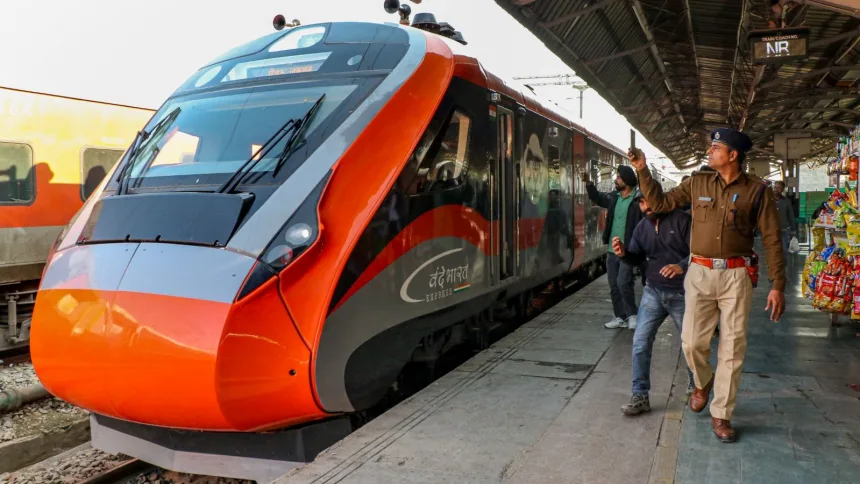Traders, growers welcome move, call it ‘lifeline’
Railways in constant touch with state, horticulture officials
Srinagar, Sep 11: In a major relief to Kashmir’s horticulture industry, Indian Railways announced on Thursday the launch of a dedicated daily parcel train to transport apples and other goods from the Valley to Delhi.
The new service, named the Joint Parcel Product–Rapid Cargo Service (JPP-RCS), comes after the prolonged closure of the Srinagar–Jammu National Highway (NH-44) due to torrential rains and floods disrupted supplies and caused heavy losses for fruit growers.
Operating between Budgam in Kashmir and Adarsh Nagar in Delhi, the train will consist of eight parcel vans and one luggage coach, offering a safer, faster, and more economical alternative to road transport. The service, approved by the Railway Board last month, will run daily, departing Budgam early morning and reaching Delhi within about 23 hours—ensuring fresh produce reaches the capital markets the next day.
Divisional Railway Manager Jammu, Vivek Kumar, said that continuous disruptions on NH-44 severely impacted traders. “Heavy rains and landslides hit road connectivity, creating huge problems for apple growers and traders. This parcel service ensures their produce reaches markets on time,” he said.
Kumar said that the authorities, including Principal Chief Commercial Manager NR and DRM Jammu, are in constant contact with state authorities, the horticulture department, and various Fruit Growers Associations and traders to ensure a smooth operation.
Kashmir produces over 70% of India’s apples, supporting thousands of families. However, growers faced mounting losses as trucks were stranded for days on blocked highways or forced to take the longer, costlier Mughal Road route.
The rail option is expected to save time and reduce freight costs for fruit traders. Besides apples, pears, walnuts, saffron, and dry fruits will be transported. Handicrafts such as pashmina shawls and carpets may also benefit from the service.
To make the service business-friendly, Indian Railways has set up a loading and unloading facility at Bari Brahmana station in Jammu, where goods can be aggregated. Security will be provided by the state police at the station and on board the train.
Senior Divisional Commercial Manager (Sr. DCM) Uchit Singhal said the train was designed to serve both small farmers and large traders.
“This is a daily service meant to benefit Kashmir’s traders. Goods like apples, saffron, walnuts, pashmina, carpets, and handicrafts will reach Delhi in less than a day, which is much quicker than road transport,” he said.
The train will initially have eight parcel vans, but officials said more could be added depending on demand. Northern Railways has also assured that additional parcel services can be introduced if required.
Officials said the initiative will not only prevent wastage of perishable produce but also give a much-needed push to Jammu and Kashmir’s economy. The Railways expects the move to create new employment opportunities in logistics, packaging, and handling.
Northern Railway’s Chief Public Relations Officer, Himanshu Shekhar Upadhyay, said that with this service, fruits will reach consumers across India on time and in good condition. This is a reliable and cost-effective alternative for Kashmir’s growers, and it will also increase the share of railways in the freight business,” he said.
Upadhyay said both moves are part of a broader strategy to strengthen freight movement in Kashmir through rail connectivity.
“The dedicated cargo service is expected to cover a distance of about 845 km daily between Budgam and Delhi, with electric traction used throughout the journey. The aim was to ensure efficiency while reducing costs,” he said.
CPRO added that these initiatives are expected to significantly benefit Kashmir industries by providing a reliable and timely mode of transportation.
The JPP-RCS model, already in use in other parts of the country, is part of Railways’ efforts to enter the courier and cargo sector more aggressively. The Jammu service is the first of its kind in the region.
The announcement has been welcomed by traders, who said the service would ease their dependence on the vulnerable Srinagar–Jammu highway.
Fruit associations in Sopore and Shopian, the two major apple belts of Kashmir, said the rail option would help cut freight costs and ensure timely delivery.
Lateef Ahmad Jaan, an apple trader from Sopore, said that sending apples by truck had become a nightmare. Drivers were charging extra because of the highway closure, and the produce would often rot on the way. A direct rail link to Delhi is a big relief,” he said.
“This train is not just about transport; it is about saving our livelihoods. If the Railways can keep this service regular, it will change the way we send our apples to market,” he added.
The parcel train follows another significant step taken last month, when Indian Railways moved its first freight train carrying cement from Punjab to Anantnag on August 9.






